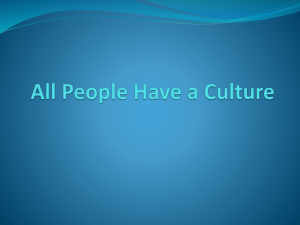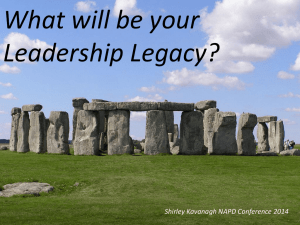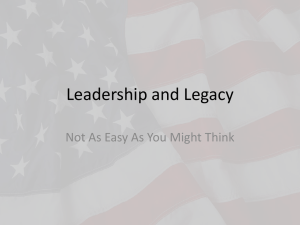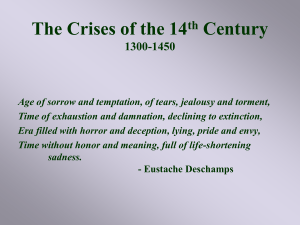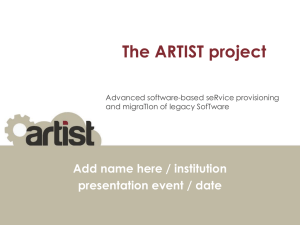Slides - AITP SD Cloud Computing Conference 2014
advertisement
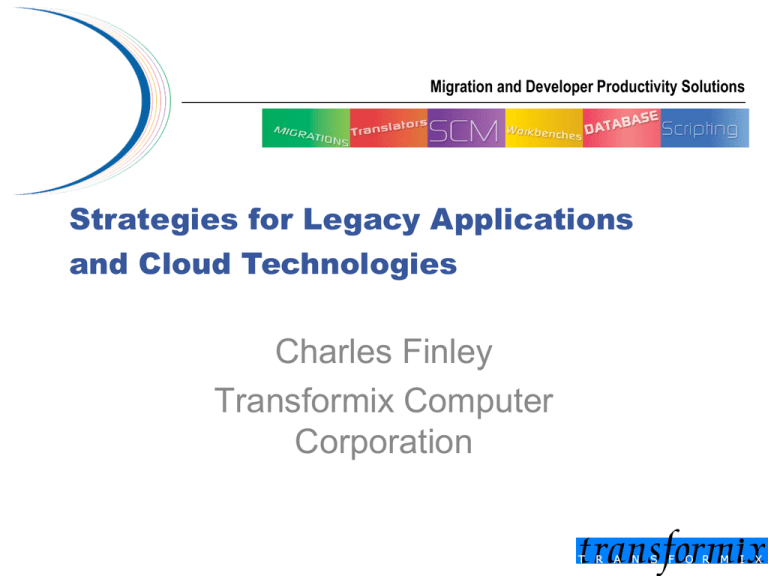
Migration and Developer Productivity Solutions Strategies for Legacy Applications and Cloud Technologies Charles Finley Transformix Computer Corporation Speaker Introduction – Charles Finley • Transformix specializes in legacy application migration and modernization • • • • • • • • • Complete Replatforming Database migrations Language conversions Integration Web and Mobile Development Databases include Oracle, IBM DB2, MSSQL, Postrgresql, Mysql Many migrations to Oracle Targets Linux, UNIX and Windows Minimally Invasive Legacy Application Modernization • 35+ years in IT • www.xformix.com Guest Speaker – Vijai (VJ) Garg OpenLayer – Legacy screen web services integration Summary Overview Landscape - Challenges New demands for the organization 1. Cloud 2. Use of web services – Google, etc. 3. UI and application access changes – Web and Mobile Nothing goes away 1. Desktop – Excel , MS ACCESS 2. CRM 3. ERP 4. Legacy and Mainframe applications Solutions Approaches Discussed Emphasized Modernization Approaches (Minimally Invasive Modernization) – High Impact Quick Win Strategies a. b. a. b. c. c. d. Modernization - 6 approach categories 1. Data Modernization 2. Web Services (SOA/API) integration and enablement 3. Replatforming through re-hosting and automated migration 4. Re-architecting to a new environment 5. Replacement with COTS solutions 6. Current Architecture in the Cloud - New Data Modernization SOA/API enablement/Web services including screen scraping, data source web services use of Enterprise Service Buses (ESB) Web 2.0 – HTML 5, css3 and JavaScript New Development for web and mobile using Current Architecture in the Cloud – IBM PureSystems Featured Product Categories a. b. Data Centric – Oracle Netbeans with Transformix migrated legacy database Screens - Terminal Emulator Centric – OpenLayer Disclaimers and Other Sermons • I am NOT a public cloud adoption cheerleader • Public cloud adoption is a tool like all other tools and its benefits need to stand on their own just like other tools • I AM a cloud technology adoption cheerleader. That is, for organizations that have legacy applications, I advocate considering • • • • • Public cloud adoption Internal cloud adoption Use of web and mobile applications Inclusion of outside web services in internal applications Development tools that enable legacy, mobile, web development for cloud and internal use • Increasing use of APIs for application access • Legacy system integration using cloud technologies • Minimally Invasive Legacy Modernization Key Messages Consumerization of APIs: Scaling integrations “A new generation of tools based on RESTful APIs will help enterprise IT embrace the opportunities and challenges from social, mobile, analytics, and cloud computing (SMAC) and consumerization of IT (CoIT).” By Carol Hildebrand, Patrick Shankland, and Vinod Baya http://www.pwc.com/us/en/technology-forecast/2012/issue2/features/featureconsumerization-apis.jhtml Web Services used in an API-centric approach to accessing existing (legacy), outside (cloud, customers, vendors) will accommodate today’s needs and future needs for integrating disparate applications. Modernize As Quickly As Possible with as Little Effort and Expense as Possible – API use is the key Session Approach 1. Provide a minimal introduction to key concepts such as SOA, RESTful APIs, ESBs, etc. 2. Briefly describe common approaches for integrating disparate applications that include legacy applications 3. Briefly describe legacy application special challenges 4. Demonstrate how APIs can be used to integrate legacy applications along with other types of applications 5. Briefly describe and demonstrate how modern development tools can be used with all types of applications 6. Provide information on how attendees can go on for further study of these subject areas Migration and Developer Productivity Solutions Buzzwords SOA, SOAP, REST, Restful API, JSON Comparing REST and SOAP http://www.pwc.com/us/en/technology-forecast/2012/issue2/features/feature-consumerization-apis.jhtml JSON versus XML Architecture for Current and Future Needs Modern UI Architecture – de facto Migration and Developer Productivity Solutions Background IT is still evolving The Internet and Web Make SOA and the Cloud Possible The Next Major Transition CLIENTSERVER MAINFRAMES MINI-COMPUTERS 1960 1970 PC 1980 SERVICE-ORIENTED INTERNET 1990 2000 2010 The Service Oriented Enterprise operates using; • Software and data as services • Hardware as virtualized resources • Autonomic data sources • Occasionally connected usage • Services that cross firewalls • But still utilizes existing legacy systems An Intel diagram of explanation 14 The Need to Assert Control It’s a jungle out there Jane! Point to Point/Spaghetti Integration ๏ Scalability, maintainability, troubleshooting nightmares. 16 © 2014 wso2 – Proprietary Some of the current challenges Need for more flexibility • Multichannel strategies • Time to market • Mergers and de-mergers Unsupportable Dependancies • Increasing amount of ‘spaghetti’ linkages • Too much of the budget spent on maintainance • Difficulties in staffing for support of legacy systems Continued cost reduction plus Compliance support Integration of Web-based channels • Enterprise portals are no longer stand-alone • Connection to legacy systems is difficult • Online systems ‘crash’ with external visibility Cross-functional processes • ERP systems have created new ‘silos’ • Need for adaptative processes • Increasing use of external ‘partners’ 17 Demand for ‘New’ IT services • • • • • • • • Collabration Communication Information ‘Services’ Global Data Sync Mobility Messaging .... Migration and Developer Productivity Solutions Toward a Complete Solution for Now and Later API Centric IT Platform 3.0 Legacy Solution Approaches Tier 1 Tier 2 Data Modernization Replatforming Convert data sources to modern databases Use COTS tools to replace older functionality Use modern development tools on legacy systems Web Services (SOA/API) integration and enablement APIs for cross platform access APIs facilitate access beyond the firewall Legacy Systems in the Cloud Re-hosting and automated migration Programming Language Translation Re-architecting to a new environment Programming Language Translation Code cleanup and restructuring Changing database calls to SQL Replacement with COTS solutions ERP CRM Other Three Selected Approaches and Web 2.0 Development Selected Modernization Approaches • Web Services • API Focused • Services for Legacy and New • Data Centric Migration • Migrate to a suitable database • Enable RAD for Legacy and New • Legacy Systems in the Cloud (IBM PureSystems) • (Web 2.0 – HTML 5, css3 and JavaScript -New Development for web and mobile using) Why • • • • Quick wins Short lead time Least Expensive Can do other approaches later • Most important that all applications be available through APIs • Minimal Testing ESB as the Integration Bus ๏ Conquering integration nightmares with WSO2 ESB 22 © 2014 wso2 – Proprietary Integration of Heterogeneous Software Artifacts in Service Oriented and Cloud Computing SOA integration and enablement Featured Products Product Integration Role Transformix Tools Migration Including Legacy to RDBMS www.xformix.com Oracle 12g Database Engine RDBMS http://www.oracle.com/ Oracle NetBeans Development Platform for Mobile, Desktop and Cloud http://www.oracle.com/technetwork/dev elopertools/netbeans/overview/index.html wso2 ESB Enterprise Service Bus and Related Services http://wso2.com/ OpenLayer Screen Integration http://www.proplus.com/ IBM-Softlayer Public Cloud Provider – Soon to include legacy systems using IBM PureSystems http://www.softlayer.com/ IBM PureSystems Can host four different operating systems (AIX, IBM i, Linux, Windows) http://www.ibm.com/ibm/puresystems/us /en/ Examples Scenario for Examples – Page 1 Database Modernization 1. Original on Legacy database 2. Modernize to MSSQL and Create Web Services 3. Use Oracle NetBase to recreate Web 2.0 small application Screen Based Web Services 1. AS/400 2. Modernize to RDBMS and Web Services 3. Create Client Building Integrated Applications © 2009 Oracle Corporation Oracle NetBase IDE © 2009 Oracle Corporation – Proprietary Example of Legacy Database Modernization and Web Service Enhancement Legacy Database •HP 3000 TurboIMAGE Database •Modernize with Transformix Tools to MSSQL •Modernize with Oracle NetBase to include Restful Web Services Based On 1. From database to RESTful web service to HTML5 in 10 minutes http://jaxenter.com/from-database-to-restful-web-service-to-html5-in-10-minutes-105524.html 2. Java RESTful Web Services Using MySQL Server, EclipseLink, and Jersey http://programmaticponderings.wordpress.com/2013/04/12/restful-web-services-using-java-and-mysql/ Transformix Database Migration Process Database Migration Resultant Runtime Database Migration Runtime with Web Services Terminal Emulator Web Services PROPlus OpenLayer Demo © 2014 OpenLegacy Config JDBC Repository Mash-up Service API / WS Interface Configuration Cloud Services Provides Interfaces using JSON User Interfaces Framework Architecture Data Services Migration and Developer Productivity Solutions Additional References Selected References Consumerization of APIs: Scaling integrations http://www.pwc.com/us/en/technology-forecast/2012/issue2/features/featureconsumerization-apis.jhtml Web Services Definitions http://www.service-architecture.com/articles/web-services/ wso2 http://wso2.com/landing/ppc/wso2/?gclid=Cj0KEQiAsueiBRCT8YOM4PDElsYBEiQAaiI4IBuTTQTBKg Z3V-vbcf9Rl5PmcOSt6l3g9W7B1kplq18aAmtC8P8HAQ Oracle Application Express http://www.oracle.com/technetwork/developer-tools/apex/overview/index.html OpenLayer http://www.proplus.com/ Summary and Conclusions IT is in a constant state of evolution Web, UI, social media technologies have made it possible to use a combination of services to interact with users, vendors and customers Cloud architecture gives management the flexibility to choose which services we use. Defacto standards are emerging HTML 5, CSS3, JavaScript, JSON, etc. Web services and API orientation help insure that applications will interface with others for a long time It makes sense to use an API focus The API focus allows the use of Legacy applications and newer applications on the same UI. Legacy applications can be dealt with in stages with Web Services being the first thing addressed Examples Database Web Services Migrated TimeEntry Database Generated Files from Database Restful Web Services Article Technique Expanded Web Services Javascript, HTML5 Client Working With Web Services
